语法专练
图片预览

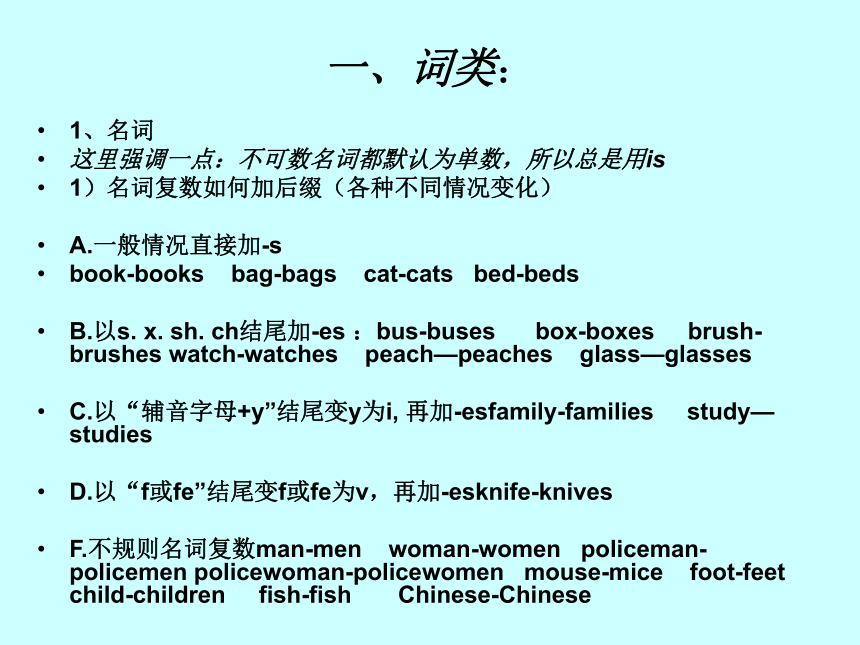
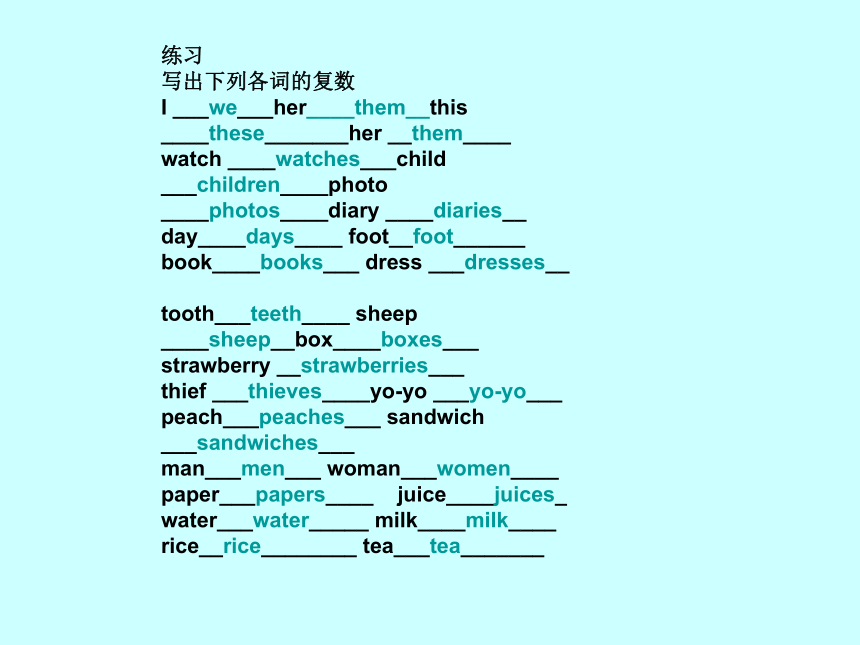
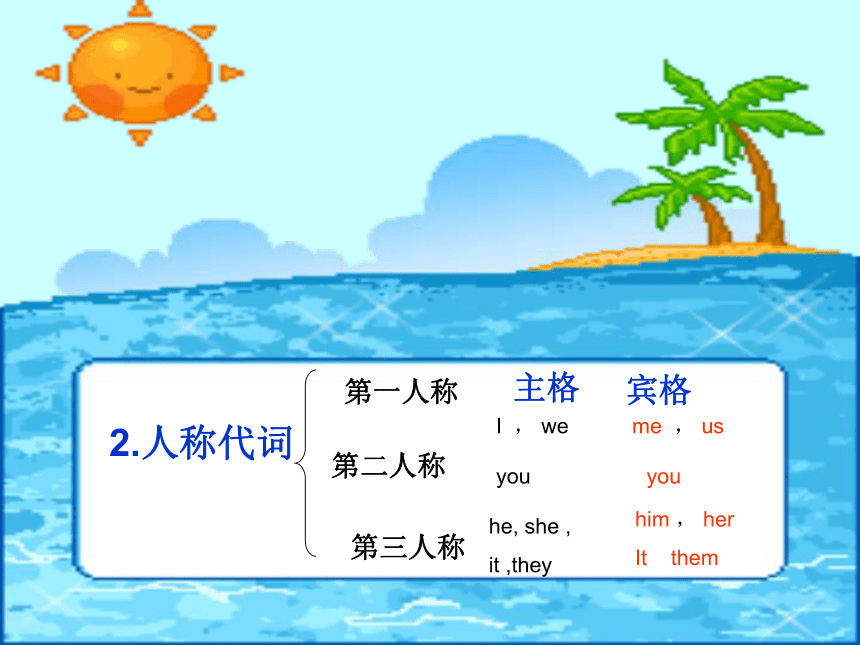
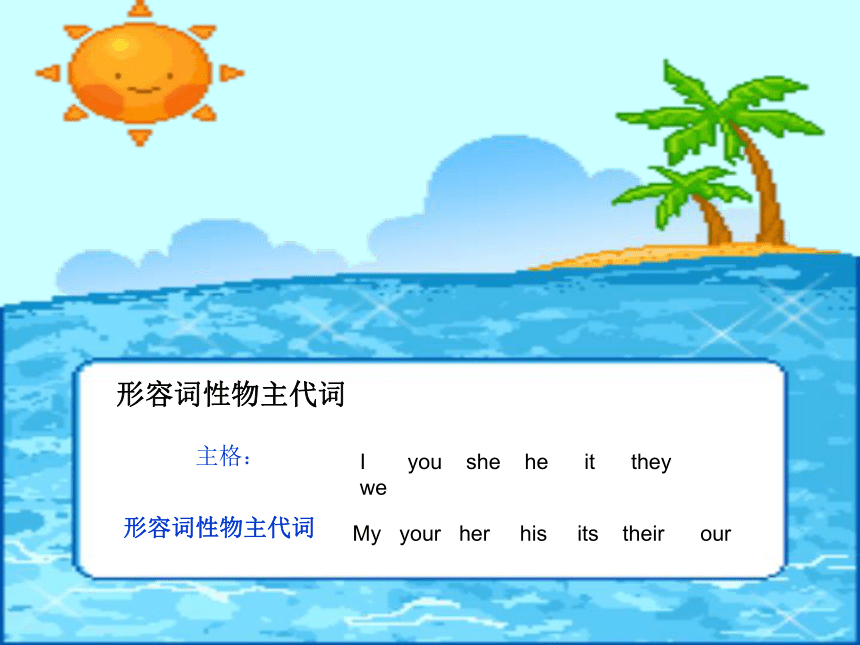
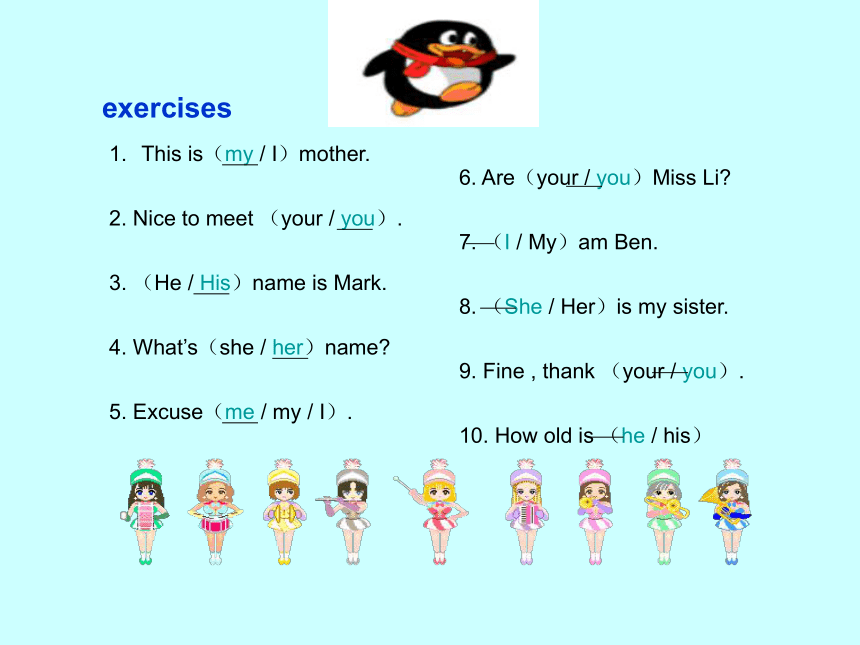
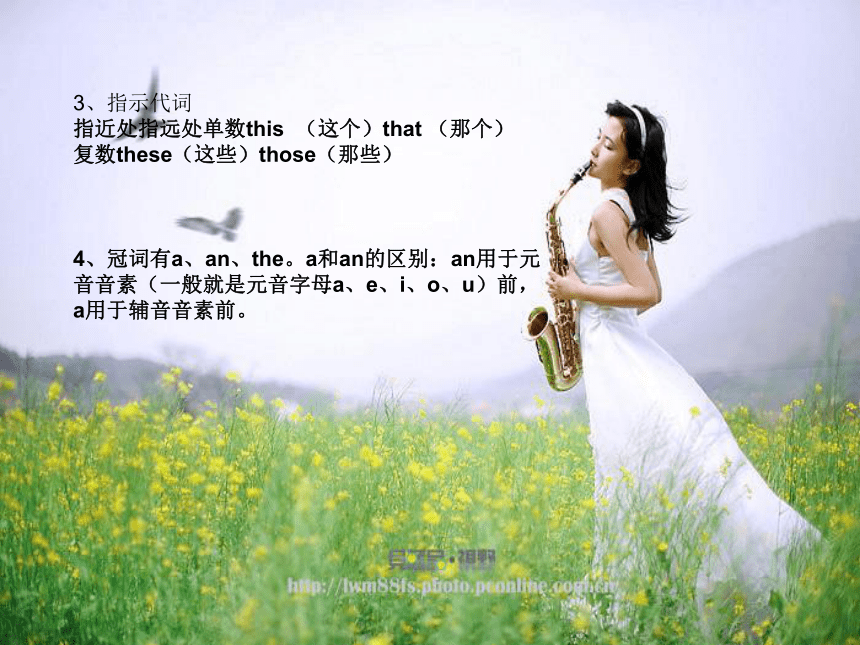
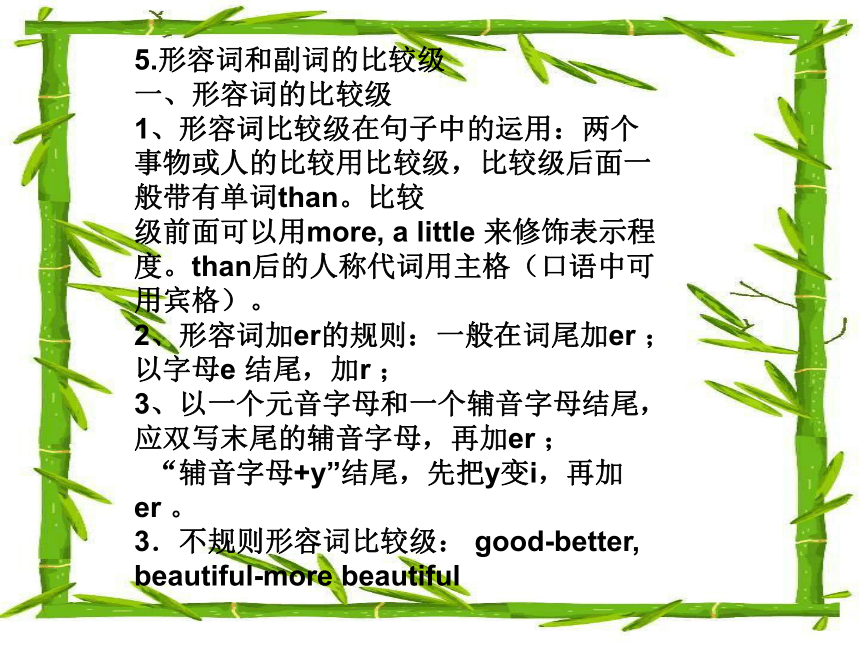
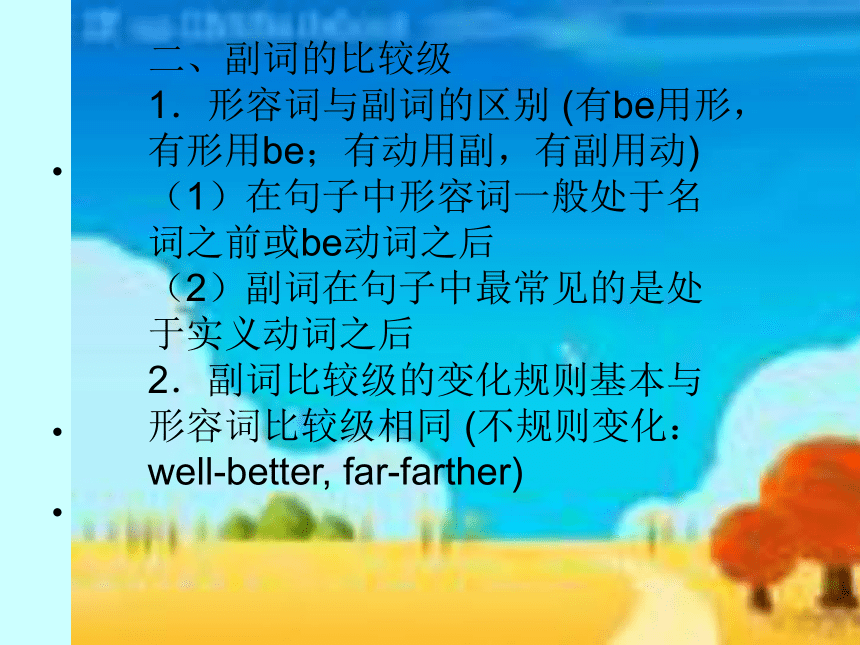
文档简介
课件29张PPT。pep小学六年级
英语语法讲座Pep版小学英语语法总复习
升中复习助手驶向成功之路一、词类:
1、名词
这里强调一点:不可数名词都默认为单数,所以总是用is
1)名词复数如何加后缀(各种不同情况变化)
A.一般情况直接加-s
book-books bag-bags cat-cats bed-beds
B.以s. x. sh. ch结尾加-es :bus-buses box-boxes brush-brushes watch-watches peach—peaches glass—glasses
C.以“辅音字母+y”结尾变y为i, 再加-esfamily-families study—studies
D.以“f或fe”结尾变f或fe为v,再加-esknife-knives
F.不规则名词复数man-men woman-women policeman-policemen policewoman-policewomen mouse-mice foot-feet child-children fish-fish Chinese-Chinese 练习
写出下列各词的复数 I ___we___her____them__this ____these_______her __them____ watch ____watches___child ___children____photo ____photos____diary ____diaries__ day____days____ foot__foot______ book____books___ dress ___dresses__
tooth___teeth____ sheep ____sheep__box____boxes___ strawberry __strawberries___ thief ___thieves____yo-yo ___yo-yo___ peach___peaches___ sandwich ___sandwiches___ man___men___ woman___women____ paper___papers____??? juice____juices_ water___water_____ milk____milk____ rice__rice________ tea___tea_______
2.人称代词第三人称第二人称第一人称I , we 主格you he, she ,
it ,theyme , us you him , her
It them宾格形容词性物主代词I you she he it they we主格:My your her his its their our形容词性物主代词This is(my / I)mother.
2. Nice to meet (your / you).
3. (He / His)name is Mark.
4. What’s(she / her)name?
5. Excuse(me / my / I).
6. Are(your / you)Miss Li?
7. (I / My)am Ben.
8. (She / Her)is my sister.
9. Fine , thank (your / you).
10. How old is (he / his)exercises3、指示代词 指近处指远处单数this (这个)that (那个) 复数these(这些)those(那些)
4、冠词有a、an、the。a和an的区别:an用于元音音素(一般就是元音字母a、e、i、o、u)前,a用于辅音音素前。3、指示代词 指近处指远处单数this (这个)that (那个) 复数these(这些)those(那些)4、冠词有a、an、the。a和an的区别:an用于元音音素(一般就是元音字母a、e、i、o、u)前,a用于辅音音素前。5.形容词和副词的比较级
一、形容词的比较级 1、形容词比较级在句子中的运用:两个事物或人的比较用比较级,比较级后面一般带有单词than。比较
级前面可以用more, a little 来修饰表示程度。than后的人称代词用主格(口语中可用宾格)。 2、形容词加er的规则:一般在词尾加er ;以字母e 结尾,加r ; 3、以一个元音字母和一个辅音字母结尾,应双写末尾的辅音字母,再加er ; “辅音字母+y”结尾,先把y变i,再加er 。 3.不规则形容词比较级:?good-better, beautiful-more beautiful5.形容词和副词的比较级
一、形容词的比较级 1、形容词比较级在句子中的运用:两个事物或人的比较用比较级,比较级后面一般带有单词than。比较
级前面可以用more, a little 来修饰表示程度。than后的人称代词用主格(口语中可用宾格)。 2、形容词加er的规则:一般在词尾加er ;以字母e 结尾,加r ; 3、以一个元音字母和一个辅音字母结尾,应双写末尾的辅音字母,再加er ; “辅音字母+y”结尾,先把y变i,再加er 。 3.不规则形容词比较级:?good-better, beautiful-more beautiful二、副词的比较级 1.形容词与副词的区别 (有be用形,有形用be;有动用副,有副用动) (1)在句子中形容词一般处于名词之前或be动词之后 (2)副词在句子中最常见的是处于实义动词之后
2.副词比较级的变化规则基本与形容词比较级相同 (不规则变化:well-better, far-farther)
二、副词的比较级 1.形容词与副词的区别 (有be用形,有形用be;有动用副,有副用动) (1)在句子中形容词一般处于名词之前或be动词之后 (2)副词在句子中最常见的是处于实义动词之后
2.副词比较级的变化规则基本与形容词比较级相同 (不规则变化:well-better, far-farther)
练习根据句意填入单词的正确形式: 1. My brother is two years __________(old)than me. 2. Tom is as ________(fat) as Jim. 3. Is your sister __________(young) than you? Yes,she is. 4. Who is ___________(thin),you or Helen? Helen is. 5. Whose pencil-box is __________(big),yours or hers? Hers is. 根据句意填入单词的正确形式: 1. My brother is two years _____older_____(old)than me. 2. Tom is as ___fater_____(fat) as Jim. 3. Is your sister ____younger______(young) than you? Yes,she is. 4. Who is ______thinner_____(thin),you or Helen? Helen is. 5. Whose pencil-box is ____bigger______(big), yours or hers? Hers is. 6. Mary’s hair is as __________(long) as Lucy’s. 7.Ben ______ (jump) ________ (high) than some of the boys in his class. 8.________ Nancy sing __________ (well) than Helen? Yes, she _____. 9.Fangfang is not as _________ (tall) as the other girls. 10.My eyes are __________(big) than ________ (she).. 11.Which is ___________(heavy),the elephant or the pig? 12.Who gets up _________(early),Tim or Tom? 6. Mary’s hair is as _____longer_____(long) as Lucy’s. 7.Ben ___jump___ (jump) ____higher____ (high) than some of the boys in his class. 8._____Does___ Nancy sing ______better____ (well) than Helen? Yes, she ___does__. 9.Fangfang is not as ______taller___ (tall) as the other girls. 10.My eyes are ___bigger_______(big) than ____her____ (she).. 11.Which is ______heavier_____(heavy),the elephant or the pig? 12.Who gets up ____earlier_____(early),Tim or Tom? 二、否定句:
be动词(am、is、are)+not、
情态动词can+ not、
助动词(do、does) + not
如何将一个肯定的陈述句改为否定句:
1、看句中有无be动词,如有,直接在be动词后+ not。
2、看句中有无情态动词,如有,直接在情态动词后+ not。
3、如上述二者都没有,就应用助动词+ not。分四个步骤:二、否定句:二否定句
be动词(am、is、are)+not、
情态动词can+ not、
助动词(do、does) + not
如何将一个肯定的陈述句改为否定句:
1、看句中有无be动词,如有,直接在be动词后+ not。
2、看句中有无情态动词,如有,直接在情态动词后+ not。
3、如上述二者都没有,就应用助动词+ not。三、一般疑问句 (1)肯定陈述句中本来是没有助动词的,要加上去,位置在主语(某人或某物)后,动词前。
(2)确定助动词用do、does,根据句中动词,动词是原形的助动词就用do,动词是第三人称单数的助动词就用does,
(3)在助动词后加not。
(4)原句中动词假如发生变化就要恢复成原形。
强调一点,有some的要考虑是否要用any。
四、特殊疑问句常用疑问词:
What time 什么时间 问具体时间,如几点
Who谁问人 Whose 谁的问主人
Where在哪里问地点
What 什么问东西、事物
What colour什么颜色问颜色
How old多大年纪问年纪
How many多少数量(可数名词)问数量
How much多少钱;多少数量(不可数名词)问多少钱或数量(不可数)五、时态常用疑问词 :
What time 什么时间 问具体时间,如几点
Who谁问人 Whose 谁的问主人
Where在哪里问地点
What 什么问东西、事物
What colour什么颜色问颜色
How old多大年纪问年纪
How many多少数量(可数名词)问数量
How much多少钱;多少数量(不可数名词)问多少钱或数量(不可数)四 特殊疑问句四特殊疑问句
常用疑问词 :
What time 什么时间 问具体时间,如几点
Who谁问人 Whose 谁的问主人
Where在哪里问地点
What 什么问东西、事物
What colour什么颜色问颜色
How old多大年纪问年纪
How many多少数量(可数名词)问数量
How much多少钱;多少数量(不可数名词)问多少钱或数量(不可数)用法:经常性的和习惯性的动作
常用时间状语 : usually,sometimes,in spring, every day,in the morning
动词构成 :动词原型. work
动词+S.(主语是第三人称单数)works
否定构成 : don’t+动原
doesn’t+动原
五 时态(一):一般现在时用法:经常性的和习惯性的动作
常用时间状语 : usually, sometimes, in spring, every day, in the morning
动词构成 :动词原型. work
动词+S.(主语是第三人称单数)works
否定构成 : don’t+动原
doesn’t+动原一般疑问构成及简答:
Do+主语+动原+其它?Yes,I do. Does+主语+动原+其它?No,he doesn’t.
特殊疑问举例 :
1. What do you often do on Sundays? 2. ?Where does he live?一般疑问构成及简答:
Do+主语+动原+其它?Yes,I do. Does+主语+动原+其它?No,he doesn’t.
特殊疑问举例 :
1. What do you often do on Sundays? 2. ?Where does he live?1.???? She ______________ (go) to school at eight o’clock.
2.???? It’s six o’clock. They are _____________ supper. (eat)
3.???? He usually ___________ up at 17:00.(get )
4.???? She ___________ (live) in Beijing.
5.???? Sally _________ (be) here just now. (刚才)
6.???? _______ (be)there a fly (苍蝇) on the table just now?
7.???? They are __________ (dig) a hole (洞).
8.???? My father _______________ (mend) his model(模型) plane these days.1.???? She ______________ (go) to school at eight o’clock.
2.???? It’s six o’clock. They are _____________ supper. (eat)
3.???? He usually ___________ up at 17:00.(get )
4.???? She ___________ (live) in Beijing.
5.???? Sally _________ (be) here just now. (刚才)
6.???? _______ (be)there a fly (苍蝇) on the table just now?
7.???? They are __________ (dig) a hole (洞).
8.???? My father _______________ (mend) his model(模型) plane these days练习 时态(二):现在进行时
用法:说话时正在进行的动作或当 前一段时间正在进行的动作
常用时间状语 :now,these days
动词构成 : am/is/are+现在分词(--ing) am/is/are working
否定构成 : am/is/are+not+现在分词
For example: Tom is playing football on the playground.
用法:说话时正在进行的动作或当 前一段时间正在进行的动作
常用时间状语 :now, these days
动词构成 : am/is/are+现在分词(--ing) am/is/are working
否定构成 : am/is/are+not+现在分词
For example: Tom is playing football on the playground.一般疑问构成及简答:
Am/Is/Are+主语+现在分词+ 其它?
Yes,I am(he is.) /No,they aren’t
特殊疑问举例:
What are you doing now? Who is flying a kite there?
一般疑问构成及简答:
Am/Is/Are+主语+现在分词+ 其它?
Yes,I am(he is.) /No,they aren’t
特殊疑问举例:
What are you doing now?
Who is flying a kite there? 用括号内所给动词的适当形式填空。
1. Look! The children________(swim) in the river.
2. Now we________(want) to play basketball.
3. -________you________(draw) a picture?
-No, I'm not. I________(write) a letter.
4.?What are you _________(do) now? I ___________(eat) bread.
5.???It’s nine o’clock. My father_______________(work) in the office.用括号内所给动词的适当形式填空。
1. Look! The children________(swim) in the river.
2. Now we________(want) to play basketball.
3. -________you________(draw) a picture?
-No, I'm not. I________(write) a letter.
4.?What are you _________(do) now? I ___________(eat) bread.
5.???It’s nine o’clock. My father_______________(work) in the office.6.???Look, the boy____________(put) the rubbish into the bin.
7.???__________he__________(clean) the classroom? No, he isn’t.
He____________(play).
8.???Where is Mak? He___________(run) on the grass.
9.???Listen, who____________(sing) in the music room? Oh,
10. Look! LiPing and Li Ying ________(play) basketball now.6.???Look, the boy____________(put) the rubbish into the bin.
7.???__________he__________(clean) the classroom? No, he isn’t.
He____________(play).
8.???Where is Mak? He___________(run) on the grass.
9.???Listen, who____________(sing) in the music room? Oh,
10. Look! LiPing and Li Ying ________(play) basketball now.一般过去时用法:过去时间发生的或过去经常性的动作 常用时间状语:yesterday,last night,two days ago, in 2000,at that time,before liberation,when 等引导的含 过去时的句子。 动词构成:动词过去时(-ed) worked work
否定构成:didn’t+动原 didn’t work
一般疑问构成及简答举例:Did+主语+动原+其它? Yes,主语+did./No, 主语+didn’t. 用法:过去时间发生的或过去经常性的动作 常用时间状语:yesterday,last night,two days ago, in 2000,at that time,before liberation,when 等引导的含 过去时的句子。 动词构成:动词过去时(-ed) worked work
否定构成:didn’t+动原 didn’t work
一般疑问构成及简答举例:Did+主语+动原+其它? Yes,主语+did./No, 主语+didn’t. 一般疑问构成及简答举例:Did+主语+动原+其它? We went to the cinema yesterday.
Did you go to the cinema yesterday ?
特殊疑问句举例:
What did he do yesterday?
When did he get up this morning?
备注:He opened the door.(不能确定门现在是否开着)一般疑问构成及简答举例:Did+主语+动原+其它? We went to the cinema yesterday.
Did you go to the cinema yesterday ?
特殊疑问句举例:
What did he do yesterday?
When did he get up this morning?
备注:He opened the door.(不能确定门现在是否开着)练习一、 用be动词的适当形式填空 1. I _______ at school just now. 2. He ________ at the camp last week. 3. We ________ students two years ago. 4. They ________ on the farm a moment ago. 5. Yang Ling ________ eleven years old last year. 6. There ________ an apple on the plate yesterday. 7. There ________ some milk in the fridge on Sunday. 8. The mobile phone _______ on the sofa yesterday evening. 一、 用be动词的适当形式填空 1. I _______ at school just now. 2. He ________ at the camp last week. 3. We ________ students two years ago. 4. They ________ on the farm a moment ago. 5. Yang Ling ________ eleven years old last year. 6. There ________ an apple on the plate yesterday. 7. There ________ some milk in the fridge on Sunday. 8. The mobile phone _______ on the sofa yesterday evening. 二、 句型转换 1. It was exciting. 否定句:___________________________________一般疑问句:___________________________________ 肯、否定回答:___________________________________ 2. All the students were very excited. ?? 否定句:___________________________________一般疑问句:___________________________________ 肯、否定回答:________________________ 1. It was exciting. 否定句:__________________________________一般疑问句:__________________________________ 肯、否定回答:___________________________________ 2. All the students were very excited. ?? 否定句:__________________________________一般疑问句:__________________________________ 肯、否定回答:________________________一般将来时用法:将来会出现或发生的动作
常用时间状语:this evening,tomorrow,next month,in a few minutes,at the end of this term 动词构成: 1,will/shall+动原 2,am/is/are going to+动词原型 3,sm/is/are(about)+动词不定式 4,am/is/are+coming等现在分词
否定构成:will/shall not do/ a m/is/are not going to do用法:将来会出现或发生的动作
常用时间状语:this evening,tomorrow,next month,in a few minutes,at the end of this term 动词构成: 1,will/shall+动原 2,am/is/are going to+动词原型 3,sm/is/are(about)+动词不定式 4,am/is/are+coming等现在分词
否定构成:will/shall not do/ a m/is/are not going to do特殊疑问句举例:
What will you do tomorrow? When are we going to have a class meeting? ?备注:在if条件或as soon as等时间状语从句中用一般现在时代替一般将来时。
I will write to you as soon as I arrived in Beijing.
特殊疑问句举例:
What will you do tomorrow? When are we going to have a class meeting? ?备注:在if条件或as soon as等时间状语从句中用一般现在时代替一般将来时。
I will write to you as soon as I arrived in Beijing.练习填空。 1.?? 我打算明天和朋友去野炊。 I_____ _______ _________ have a picnic with my friends. I ________ have a picnic with my friends. 2.?? 下个星期一你打算去干嘛? 我想去打篮球。 What ________ ________ _________ _________ _________ next Monday? I _______ ______ _____ play basketball. What _________ you do next Monday? I ________ play basketball. 3. 你妈妈这个周末去购物吗?是,她要去买一些水果。 _____ your mother _______ ________ go shopping this ___________? Yes, she _________. She ______ ________ __________ buy some fruit. 4. 你们打算什么时候见面。 What time _______ you _________ __________ meet? 填空。 1.?? 我打算明天和朋友去野炊。 I_____ _______ _________ have a picnic with my friends. I ________ have a picnic with my friends. 2.?? 下个星期一你打算去干嘛? 我想去打篮球。 What ________ ________ _________ _________ _________ next Monday? I _______ ______ _____ play basketball. What _________ you do next Monday? I ________ play basketball. 3. 你妈妈这个周末去购物吗?是,她要去买一些水果。 _____ your mother _______ ________ go shopping this ___________? Yes, she _________. She ______ ________ __________ buy some fruit. 4. 你们打算什么时候见面。 See you !
升中复习助手驶向成功之路一、词类:
1、名词
这里强调一点:不可数名词都默认为单数,所以总是用is
1)名词复数如何加后缀(各种不同情况变化)
A.一般情况直接加-s
book-books bag-bags cat-cats bed-beds
B.以s. x. sh. ch结尾加-es :bus-buses box-boxes brush-brushes watch-watches peach—peaches glass—glasses
C.以“辅音字母+y”结尾变y为i, 再加-esfamily-families study—studies
D.以“f或fe”结尾变f或fe为v,再加-esknife-knives
F.不规则名词复数man-men woman-women policeman-policemen policewoman-policewomen mouse-mice foot-feet child-children fish-fish Chinese-Chinese 练习
写出下列各词的复数 I ___we___her____them__this ____these_______her __them____ watch ____watches___child ___children____photo ____photos____diary ____diaries__ day____days____ foot__foot______ book____books___ dress ___dresses__
tooth___teeth____ sheep ____sheep__box____boxes___ strawberry __strawberries___ thief ___thieves____yo-yo ___yo-yo___ peach___peaches___ sandwich ___sandwiches___ man___men___ woman___women____ paper___papers____??? juice____juices_ water___water_____ milk____milk____ rice__rice________ tea___tea_______
2.人称代词第三人称第二人称第一人称I , we 主格you he, she ,
it ,theyme , us you him , her
It them宾格形容词性物主代词I you she he it they we主格:My your her his its their our形容词性物主代词This is(my / I)mother.
2. Nice to meet (your / you).
3. (He / His)name is Mark.
4. What’s(she / her)name?
5. Excuse(me / my / I).
6. Are(your / you)Miss Li?
7. (I / My)am Ben.
8. (She / Her)is my sister.
9. Fine , thank (your / you).
10. How old is (he / his)exercises3、指示代词 指近处指远处单数this (这个)that (那个) 复数these(这些)those(那些)
4、冠词有a、an、the。a和an的区别:an用于元音音素(一般就是元音字母a、e、i、o、u)前,a用于辅音音素前。3、指示代词 指近处指远处单数this (这个)that (那个) 复数these(这些)those(那些)4、冠词有a、an、the。a和an的区别:an用于元音音素(一般就是元音字母a、e、i、o、u)前,a用于辅音音素前。5.形容词和副词的比较级
一、形容词的比较级 1、形容词比较级在句子中的运用:两个事物或人的比较用比较级,比较级后面一般带有单词than。比较
级前面可以用more, a little 来修饰表示程度。than后的人称代词用主格(口语中可用宾格)。 2、形容词加er的规则:一般在词尾加er ;以字母e 结尾,加r ; 3、以一个元音字母和一个辅音字母结尾,应双写末尾的辅音字母,再加er ; “辅音字母+y”结尾,先把y变i,再加er 。 3.不规则形容词比较级:?good-better, beautiful-more beautiful5.形容词和副词的比较级
一、形容词的比较级 1、形容词比较级在句子中的运用:两个事物或人的比较用比较级,比较级后面一般带有单词than。比较
级前面可以用more, a little 来修饰表示程度。than后的人称代词用主格(口语中可用宾格)。 2、形容词加er的规则:一般在词尾加er ;以字母e 结尾,加r ; 3、以一个元音字母和一个辅音字母结尾,应双写末尾的辅音字母,再加er ; “辅音字母+y”结尾,先把y变i,再加er 。 3.不规则形容词比较级:?good-better, beautiful-more beautiful二、副词的比较级 1.形容词与副词的区别 (有be用形,有形用be;有动用副,有副用动) (1)在句子中形容词一般处于名词之前或be动词之后 (2)副词在句子中最常见的是处于实义动词之后
2.副词比较级的变化规则基本与形容词比较级相同 (不规则变化:well-better, far-farther)
二、副词的比较级 1.形容词与副词的区别 (有be用形,有形用be;有动用副,有副用动) (1)在句子中形容词一般处于名词之前或be动词之后 (2)副词在句子中最常见的是处于实义动词之后
2.副词比较级的变化规则基本与形容词比较级相同 (不规则变化:well-better, far-farther)
练习根据句意填入单词的正确形式: 1. My brother is two years __________(old)than me. 2. Tom is as ________(fat) as Jim. 3. Is your sister __________(young) than you? Yes,she is. 4. Who is ___________(thin),you or Helen? Helen is. 5. Whose pencil-box is __________(big),yours or hers? Hers is. 根据句意填入单词的正确形式: 1. My brother is two years _____older_____(old)than me. 2. Tom is as ___fater_____(fat) as Jim. 3. Is your sister ____younger______(young) than you? Yes,she is. 4. Who is ______thinner_____(thin),you or Helen? Helen is. 5. Whose pencil-box is ____bigger______(big), yours or hers? Hers is. 6. Mary’s hair is as __________(long) as Lucy’s. 7.Ben ______ (jump) ________ (high) than some of the boys in his class. 8.________ Nancy sing __________ (well) than Helen? Yes, she _____. 9.Fangfang is not as _________ (tall) as the other girls. 10.My eyes are __________(big) than ________ (she).. 11.Which is ___________(heavy),the elephant or the pig? 12.Who gets up _________(early),Tim or Tom? 6. Mary’s hair is as _____longer_____(long) as Lucy’s. 7.Ben ___jump___ (jump) ____higher____ (high) than some of the boys in his class. 8._____Does___ Nancy sing ______better____ (well) than Helen? Yes, she ___does__. 9.Fangfang is not as ______taller___ (tall) as the other girls. 10.My eyes are ___bigger_______(big) than ____her____ (she).. 11.Which is ______heavier_____(heavy),the elephant or the pig? 12.Who gets up ____earlier_____(early),Tim or Tom? 二、否定句:
be动词(am、is、are)+not、
情态动词can+ not、
助动词(do、does) + not
如何将一个肯定的陈述句改为否定句:
1、看句中有无be动词,如有,直接在be动词后+ not。
2、看句中有无情态动词,如有,直接在情态动词后+ not。
3、如上述二者都没有,就应用助动词+ not。分四个步骤:二、否定句:二否定句
be动词(am、is、are)+not、
情态动词can+ not、
助动词(do、does) + not
如何将一个肯定的陈述句改为否定句:
1、看句中有无be动词,如有,直接在be动词后+ not。
2、看句中有无情态动词,如有,直接在情态动词后+ not。
3、如上述二者都没有,就应用助动词+ not。三、一般疑问句 (1)肯定陈述句中本来是没有助动词的,要加上去,位置在主语(某人或某物)后,动词前。
(2)确定助动词用do、does,根据句中动词,动词是原形的助动词就用do,动词是第三人称单数的助动词就用does,
(3)在助动词后加not。
(4)原句中动词假如发生变化就要恢复成原形。
强调一点,有some的要考虑是否要用any。
四、特殊疑问句常用疑问词:
What time 什么时间 问具体时间,如几点
Who谁问人 Whose 谁的问主人
Where在哪里问地点
What 什么问东西、事物
What colour什么颜色问颜色
How old多大年纪问年纪
How many多少数量(可数名词)问数量
How much多少钱;多少数量(不可数名词)问多少钱或数量(不可数)五、时态常用疑问词 :
What time 什么时间 问具体时间,如几点
Who谁问人 Whose 谁的问主人
Where在哪里问地点
What 什么问东西、事物
What colour什么颜色问颜色
How old多大年纪问年纪
How many多少数量(可数名词)问数量
How much多少钱;多少数量(不可数名词)问多少钱或数量(不可数)四 特殊疑问句四特殊疑问句
常用疑问词 :
What time 什么时间 问具体时间,如几点
Who谁问人 Whose 谁的问主人
Where在哪里问地点
What 什么问东西、事物
What colour什么颜色问颜色
How old多大年纪问年纪
How many多少数量(可数名词)问数量
How much多少钱;多少数量(不可数名词)问多少钱或数量(不可数)用法:经常性的和习惯性的动作
常用时间状语 : usually,sometimes,in spring, every day,in the morning
动词构成 :动词原型. work
动词+S.(主语是第三人称单数)works
否定构成 : don’t+动原
doesn’t+动原
五 时态(一):一般现在时用法:经常性的和习惯性的动作
常用时间状语 : usually, sometimes, in spring, every day, in the morning
动词构成 :动词原型. work
动词+S.(主语是第三人称单数)works
否定构成 : don’t+动原
doesn’t+动原一般疑问构成及简答:
Do+主语+动原+其它?Yes,I do. Does+主语+动原+其它?No,he doesn’t.
特殊疑问举例 :
1. What do you often do on Sundays? 2. ?Where does he live?一般疑问构成及简答:
Do+主语+动原+其它?Yes,I do. Does+主语+动原+其它?No,he doesn’t.
特殊疑问举例 :
1. What do you often do on Sundays? 2. ?Where does he live?1.???? She ______________ (go) to school at eight o’clock.
2.???? It’s six o’clock. They are _____________ supper. (eat)
3.???? He usually ___________ up at 17:00.(get )
4.???? She ___________ (live) in Beijing.
5.???? Sally _________ (be) here just now. (刚才)
6.???? _______ (be)there a fly (苍蝇) on the table just now?
7.???? They are __________ (dig) a hole (洞).
8.???? My father _______________ (mend) his model(模型) plane these days.1.???? She ______________ (go) to school at eight o’clock.
2.???? It’s six o’clock. They are _____________ supper. (eat)
3.???? He usually ___________ up at 17:00.(get )
4.???? She ___________ (live) in Beijing.
5.???? Sally _________ (be) here just now. (刚才)
6.???? _______ (be)there a fly (苍蝇) on the table just now?
7.???? They are __________ (dig) a hole (洞).
8.???? My father _______________ (mend) his model(模型) plane these days练习 时态(二):现在进行时
用法:说话时正在进行的动作或当 前一段时间正在进行的动作
常用时间状语 :now,these days
动词构成 : am/is/are+现在分词(--ing) am/is/are working
否定构成 : am/is/are+not+现在分词
For example: Tom is playing football on the playground.
用法:说话时正在进行的动作或当 前一段时间正在进行的动作
常用时间状语 :now, these days
动词构成 : am/is/are+现在分词(--ing) am/is/are working
否定构成 : am/is/are+not+现在分词
For example: Tom is playing football on the playground.一般疑问构成及简答:
Am/Is/Are+主语+现在分词+ 其它?
Yes,I am(he is.) /No,they aren’t
特殊疑问举例:
What are you doing now? Who is flying a kite there?
一般疑问构成及简答:
Am/Is/Are+主语+现在分词+ 其它?
Yes,I am(he is.) /No,they aren’t
特殊疑问举例:
What are you doing now?
Who is flying a kite there? 用括号内所给动词的适当形式填空。
1. Look! The children________(swim) in the river.
2. Now we________(want) to play basketball.
3. -________you________(draw) a picture?
-No, I'm not. I________(write) a letter.
4.?What are you _________(do) now? I ___________(eat) bread.
5.???It’s nine o’clock. My father_______________(work) in the office.用括号内所给动词的适当形式填空。
1. Look! The children________(swim) in the river.
2. Now we________(want) to play basketball.
3. -________you________(draw) a picture?
-No, I'm not. I________(write) a letter.
4.?What are you _________(do) now? I ___________(eat) bread.
5.???It’s nine o’clock. My father_______________(work) in the office.6.???Look, the boy____________(put) the rubbish into the bin.
7.???__________he__________(clean) the classroom? No, he isn’t.
He____________(play).
8.???Where is Mak? He___________(run) on the grass.
9.???Listen, who____________(sing) in the music room? Oh,
10. Look! LiPing and Li Ying ________(play) basketball now.6.???Look, the boy____________(put) the rubbish into the bin.
7.???__________he__________(clean) the classroom? No, he isn’t.
He____________(play).
8.???Where is Mak? He___________(run) on the grass.
9.???Listen, who____________(sing) in the music room? Oh,
10. Look! LiPing and Li Ying ________(play) basketball now.一般过去时用法:过去时间发生的或过去经常性的动作 常用时间状语:yesterday,last night,two days ago, in 2000,at that time,before liberation,when 等引导的含 过去时的句子。 动词构成:动词过去时(-ed) worked work
否定构成:didn’t+动原 didn’t work
一般疑问构成及简答举例:Did+主语+动原+其它? Yes,主语+did./No, 主语+didn’t. 用法:过去时间发生的或过去经常性的动作 常用时间状语:yesterday,last night,two days ago, in 2000,at that time,before liberation,when 等引导的含 过去时的句子。 动词构成:动词过去时(-ed) worked work
否定构成:didn’t+动原 didn’t work
一般疑问构成及简答举例:Did+主语+动原+其它? Yes,主语+did./No, 主语+didn’t. 一般疑问构成及简答举例:Did+主语+动原+其它? We went to the cinema yesterday.
Did you go to the cinema yesterday ?
特殊疑问句举例:
What did he do yesterday?
When did he get up this morning?
备注:He opened the door.(不能确定门现在是否开着)一般疑问构成及简答举例:Did+主语+动原+其它? We went to the cinema yesterday.
Did you go to the cinema yesterday ?
特殊疑问句举例:
What did he do yesterday?
When did he get up this morning?
备注:He opened the door.(不能确定门现在是否开着)练习一、 用be动词的适当形式填空 1. I _______ at school just now. 2. He ________ at the camp last week. 3. We ________ students two years ago. 4. They ________ on the farm a moment ago. 5. Yang Ling ________ eleven years old last year. 6. There ________ an apple on the plate yesterday. 7. There ________ some milk in the fridge on Sunday. 8. The mobile phone _______ on the sofa yesterday evening. 一、 用be动词的适当形式填空 1. I _______ at school just now. 2. He ________ at the camp last week. 3. We ________ students two years ago. 4. They ________ on the farm a moment ago. 5. Yang Ling ________ eleven years old last year. 6. There ________ an apple on the plate yesterday. 7. There ________ some milk in the fridge on Sunday. 8. The mobile phone _______ on the sofa yesterday evening. 二、 句型转换 1. It was exciting. 否定句:___________________________________一般疑问句:___________________________________ 肯、否定回答:___________________________________ 2. All the students were very excited. ?? 否定句:___________________________________一般疑问句:___________________________________ 肯、否定回答:________________________ 1. It was exciting. 否定句:__________________________________一般疑问句:__________________________________ 肯、否定回答:___________________________________ 2. All the students were very excited. ?? 否定句:__________________________________一般疑问句:__________________________________ 肯、否定回答:________________________一般将来时用法:将来会出现或发生的动作
常用时间状语:this evening,tomorrow,next month,in a few minutes,at the end of this term 动词构成: 1,will/shall+动原 2,am/is/are going to+动词原型 3,sm/is/are(about)+动词不定式 4,am/is/are+coming等现在分词
否定构成:will/shall not do/ a m/is/are not going to do用法:将来会出现或发生的动作
常用时间状语:this evening,tomorrow,next month,in a few minutes,at the end of this term 动词构成: 1,will/shall+动原 2,am/is/are going to+动词原型 3,sm/is/are(about)+动词不定式 4,am/is/are+coming等现在分词
否定构成:will/shall not do/ a m/is/are not going to do特殊疑问句举例:
What will you do tomorrow? When are we going to have a class meeting? ?备注:在if条件或as soon as等时间状语从句中用一般现在时代替一般将来时。
I will write to you as soon as I arrived in Beijing.
特殊疑问句举例:
What will you do tomorrow? When are we going to have a class meeting? ?备注:在if条件或as soon as等时间状语从句中用一般现在时代替一般将来时。
I will write to you as soon as I arrived in Beijing.练习填空。 1.?? 我打算明天和朋友去野炊。 I_____ _______ _________ have a picnic with my friends. I ________ have a picnic with my friends. 2.?? 下个星期一你打算去干嘛? 我想去打篮球。 What ________ ________ _________ _________ _________ next Monday? I _______ ______ _____ play basketball. What _________ you do next Monday? I ________ play basketball. 3. 你妈妈这个周末去购物吗?是,她要去买一些水果。 _____ your mother _______ ________ go shopping this ___________? Yes, she _________. She ______ ________ __________ buy some fruit. 4. 你们打算什么时候见面。 What time _______ you _________ __________ meet? 填空。 1.?? 我打算明天和朋友去野炊。 I_____ _______ _________ have a picnic with my friends. I ________ have a picnic with my friends. 2.?? 下个星期一你打算去干嘛? 我想去打篮球。 What ________ ________ _________ _________ _________ next Monday? I _______ ______ _____ play basketball. What _________ you do next Monday? I ________ play basketball. 3. 你妈妈这个周末去购物吗?是,她要去买一些水果。 _____ your mother _______ ________ go shopping this ___________? Yes, she _________. She ______ ________ __________ buy some fruit. 4. 你们打算什么时候见面。 See you !
